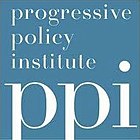Progressive Policy Institute: Difference between revisions
m copyedits, links |
No edit summary |
||
| Line 20: | Line 20: | ||
Its founder and current president is [[Will Marshall]], who writes on foreign policy, defense, national service, [[globalization]], trade policy, and cultural issues. Its chief economic strategist is [[Michael Mandel (economist)|Michael Mandel]], who writes on innovation, growth, and regulatory policy. |
Its founder and current president is [[Will Marshall]], who writes on foreign policy, defense, national service, [[globalization]], trade policy, and cultural issues. Its chief economic strategist is [[Michael Mandel (economist)|Michael Mandel]], who writes on innovation, growth, and regulatory policy. |
||
The Progressive Policy Institute was founded as a branch of the [[Democratic Leadership Council]] in 1989. When [[Bill Clinton]], the DLC's former Chairman, made up his mind to run for the presidency in 1992, the PPI spotted the right candidate to promote its |
The Progressive Policy Institute was founded as a branch of the [[Democratic Leadership Council]] in 1989. When [[Bill Clinton]], the DLC's former Chairman, made up his mind to run for the presidency in 1992, the PPI spotted the right candidate to promote its [[neoliberal]] mission. When Clinton endorsed the PPI’s blueprint Mandate for Change, a reform of government, many journalists concluded that the PPI’s views would dominate [[Washington, D.C.|Washington]]’s agenda. Most notably, the PPI believes in restoring the [[American Dream]] by accelerating economic growth, educational excellence, expanding opportunity, and enhancing financial and personal security. Moreover, crime prevention, health care and environmental safety found their way on Clinton’s New Democrat platform. The PPI also asserts that global order can be supported by building new international structures based on economic and political freedom. The PPI research demands a new progressive politics for the United States while modeling its marketing strategy similar to the [[Heritage Foundation]] and the [[Cato Institute]].<ref>Arin, Kubilay Yado (2013): ''Think Tanks, the Brain Trusts of US Foreign Policy''. Wiesbaden: VS Springer.</ref> |
||
== See also == |
== See also == |
||
Revision as of 15:56, 24 December 2014
This article needs additional citations for verification. (September 2013) |
 | |
| Abbreviation | PPI |
|---|---|
| Formation | 1989 |
| Type | Public policy think tank |
| Headquarters | 1101 14th St. NW Suite 1250 |
| Location |
|
President and CEO | Will Marshall |
| Website | http://www.progressivepolicy.org/ |
The Progressive Policy Institute (PPI) is a non-profit, 501(c)(3) organization that serves as a public policy think tank in the United States, founded in 1989. It styles itself as promoting the ideas of "New Democrats", covering a wide range of issues and describes itself as centrist.
Its founder and current president is Will Marshall, who writes on foreign policy, defense, national service, globalization, trade policy, and cultural issues. Its chief economic strategist is Michael Mandel, who writes on innovation, growth, and regulatory policy.
The Progressive Policy Institute was founded as a branch of the Democratic Leadership Council in 1989. When Bill Clinton, the DLC's former Chairman, made up his mind to run for the presidency in 1992, the PPI spotted the right candidate to promote its neoliberal mission. When Clinton endorsed the PPI’s blueprint Mandate for Change, a reform of government, many journalists concluded that the PPI’s views would dominate Washington’s agenda. Most notably, the PPI believes in restoring the American Dream by accelerating economic growth, educational excellence, expanding opportunity, and enhancing financial and personal security. Moreover, crime prevention, health care and environmental safety found their way on Clinton’s New Democrat platform. The PPI also asserts that global order can be supported by building new international structures based on economic and political freedom. The PPI research demands a new progressive politics for the United States while modeling its marketing strategy similar to the Heritage Foundation and the Cato Institute.[1]
See also
References
- ^ Arin, Kubilay Yado (2013): Think Tanks, the Brain Trusts of US Foreign Policy. Wiesbaden: VS Springer.
External links
